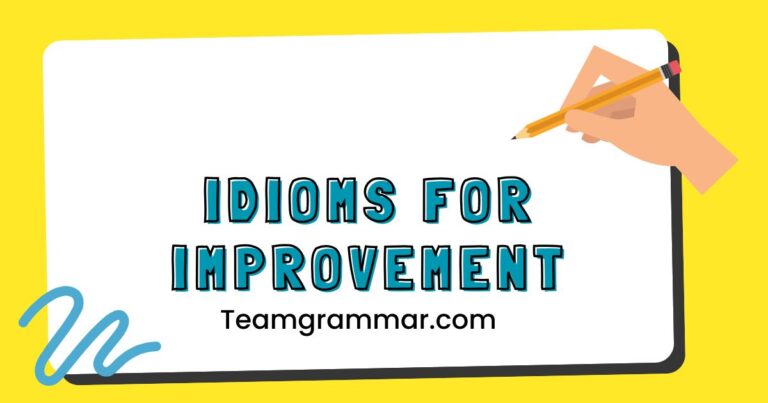33 Business Idioms: Mastering Common Phrases for Success
Understanding idioms is crucial for effective communication in any field, but especially in business. Idioms are phrases whose meaning cannot be understood from the literal meanings of the individual words.
They add color and nuance to conversations, but can also be confusing for non-native speakers. This article provides a comprehensive guide to business idioms, explaining their meanings, usage, and providing numerous examples to help you confidently navigate the world of business English.
Whether you’re a student, a seasoned professional, or simply looking to improve your business communication skills, this guide will equip you with the knowledge to understand and use business idioms effectively.
Table of Contents
- Definition of Business Idioms
- Structural Breakdown of Business Idioms
- Types of Business Idioms
- Examples of Business Idioms
- Usage Rules for Business Idioms
- Common Mistakes with Business Idioms
- Practice Exercises
- Advanced Topics in Business Idioms
- Frequently Asked Questions (FAQ)
- Conclusion
Definition of Business Idioms
Business idioms are specialized phrases used in the professional world to convey specific meanings that are different from the literal definitions of the words they contain. These idioms are essential for understanding the nuances of business communication, whether in meetings, emails, presentations, or casual conversations.
Mastering business idioms helps you interpret the intended message accurately and respond appropriately, enhancing your credibility and effectiveness in the workplace.
Classification: Business idioms can be classified based on their origin, industry-specific usage, or the type of concept they represent. Some may come from general English idioms adapted for business, while others might be specific to certain industries like finance, marketing, or technology.
Function:The primary function of business idioms is to provide a concise and often colorful way to express complex ideas or situations. They add depth and personality to communication, making it more engaging and relatable.
However, their non-literal nature requires a good understanding to avoid misinterpretation.
Contexts: Business idioms are used in a wide range of contexts, including formal settings like board meetings and presentations, as well as informal settings like team lunches and casual conversations. The appropriateness of using a particular idiom depends on the audience, the context, and the overall tone of the communication.
Structural Breakdown of Business Idioms
Understanding the structure of business idioms involves recognizing that they are fixed expressions. This means the words within the idiom cannot be changed without altering or losing the intended meaning.
Idioms often consist of a combination of nouns, verbs, adjectives, and prepositions that together create a unique meaning. The structure may sometimes resemble a common grammatical pattern, but the meaning is always figurative.
For example, the idiom “touch base” follows a verb-noun structure. However, its meaning – to make contact or communicate briefly – is not evident from the literal meaning of “touch” and “base.” Similarly, “get the ball rolling” has a verb-noun structure, but it means to start a process or activity.
Recognizing common structural patterns can help you identify and understand new idioms more easily. Pay attention to the combination of words and their relationship to each other.
The key is to remember that the meaning lies in the entire phrase, not the individual words.
Types of Business Idioms
Business idioms can be categorized based on the concepts they represent. Here are some common categories:
Idioms Related to Success and Failure
These idioms describe the outcomes of business ventures, projects, or individual efforts. They can indicate triumph, setback, or mediocrity.
Idioms Related to Competition
These idioms highlight the competitive nature of the business world, describing strategies, tactics, and the struggle to gain an advantage.
Idioms Related to Finance and Money
These idioms focus on financial aspects of business, such as investments, profits, losses, and budgeting.
Idioms Related to Time Management
These idioms pertain to the efficient use of time, deadlines, and the pace of work.
Idioms Related to Problem Solving
These idioms describe approaches to resolving issues, overcoming challenges, and finding solutions.
Examples of Business Idioms
The following tables provide extensive examples of business idioms, categorized for easier understanding. Each idiom is accompanied by its meaning and example sentences to illustrate its usage.
Idioms Related to Success and Failure
This table illustrates idioms focused on success and failure in business. Understanding these idioms can help you interpret the outcomes and results discussed in business settings.
| Idiom | Meaning | Example Sentence |
|---|---|---|
| Hit a home run | Achieve a great success. | The marketing team hit a home run with their latest campaign. |
| Miss the mark | Fail to achieve the intended goal. | The new product missed the mark because it didn’t meet customer needs. |
| Go belly up | Fail financially; go bankrupt. | Unfortunately, the company went belly up after the economic downturn. |
| Be in the black | Be profitable. | After a tough year, the company is finally in the black. |
| Be in the red | Be losing money. | The project is currently in the red, so we need to cut costs. |
| Make a killing | Earn a lot of money quickly. | They made a killing on the stock market last year. |
| Strike gold | Discover something valuable. | The company struck gold with their innovative technology. |
| Go down the drain | Be wasted or lost. | If we don’t act quickly, all our hard work will go down the drain. |
| Sink or swim | Succeed or fail on one’s own. | The new recruits were thrown into the project to sink or swim. |
| Go the extra mile | Do more than what is expected. | She always goes the extra mile to ensure customer satisfaction. |
| Take a nosedive | Decline rapidly and dramatically. | The company’s profits took a nosedive after the scandal. |
| Come up short | Fail to reach a required goal or standard. | We came up short on our sales target this quarter. |
| Cream of the crop | The best of a group. | Our team consists of the cream of the crop in the industry. |
| Fall by the wayside | Fail to succeed; be abandoned or forgotten. | Many small businesses fall by the wayside during a recession. |
| Keep your head above water | Manage to survive financially or in a difficult situation. | We’re just trying to keep our heads above water until the economy improves. |
| Land on your feet | Recover quickly from a setback. | Despite the initial challenges, he managed to land on his feet and turn the project around. |
| Make a splash | Attract a lot of attention. | The new product launch made a splash in the market. |
| On the ball | Alert, competent, and efficient. | Our project manager is always on the ball, ensuring everything runs smoothly. |
| Take off | Become successful or popular very quickly. | The company’s sales took off after the new marketing campaign. |
| Knock it out of the park | To do something exceptionally well; to achieve great success. | She knocked it out of the park with her presentation, securing the deal for the company. |
| Go through the roof | To increase to a very high level. | Demand for the new product went through the roof after the celebrity endorsement. |
| Hit the ground running | To start something quickly and successfully. | The new CEO hit the ground running and immediately began implementing changes. |
| Go places | To be successful in the future. | With his talent and dedication, he’s definitely going to go places in this company. |
Idioms Related to Competition
This table provides idioms that capture the essence of competition in the business world. Use these to describe competitive strategies and market dynamics.
| Idiom | Meaning | Example Sentence |
|---|---|---|
| Stay ahead of the curve | Remain innovative and competitive. | To stay ahead of the curve, we need to invest in research and development. |
| Level the playing field | Create a fair and equal competitive environment. | The new regulations are intended to level the playing field for small businesses. |
| Move the goalposts | Change the rules or requirements unfairly. | They moved the goalposts at the last minute, making it impossible to win the contract. |
| Neck and neck | Very close in a competition. | The two companies are neck and neck in the race for market share. |
| Cutthroat | Extremely competitive and ruthless. | The software industry is known for its cutthroat competition. |
| The gloves are off | The competition has become more intense and aggressive. | The gloves are off now that both companies are launching similar products. |
| Get a foot in the door | Get a first opportunity to work for a company or enter a field. | Interning at the company helped me get a foot in the door. |
| Corner the market | Dominate a particular market. | They are trying to corner the market on renewable energy. |
| A race to the bottom | A situation where companies lower standards to compete on price. | The price wars are leading to a race to the bottom in the airline industry. |
| One-up someone | Do something better than someone else to gain an advantage. | He always tries to one-up his colleagues in meetings. |
| Raise the bar | Set a higher standard or expectation. | The new product raised the bar for the entire industry. |
| Stay one step ahead | Maintain an advantage over competitors. | We need to stay one step ahead by anticipating market trends. |
| Beat the competition | Outperform rivals in the market. | Our goal is to beat the competition by offering superior customer service. |
| Gain ground | Make progress and increase market share. | The new company is gaining ground rapidly in the tech sector. |
| Edge out the competition | Slightly outperform rivals. | We managed to edge out the competition by offering a better price. |
| Go head to head | Compete directly with someone. | The two companies will go head to head in the upcoming product launch. |
| Hold your own | Maintain your position in a competitive situation. | The small business is holding its own against the larger corporations. |
| In the running | Still having a chance to win or succeed. | We are still in the running for the contract, despite the challenges. |
| Keep pace with | Maintain the same speed or level as someone or something else. | We need to keep pace with the latest technological advancements. |
| Take the lead | Gain an advantage and become the leader. | Our innovative marketing strategy allowed us to take the lead in the market. |
| A cut above | Superior to. | Their customer service is a cut above the rest. |
| In the same league | At the same level of quality or ability. | Although they are a competitor, they are not in the same league as us. |
| Out of the running | No longer having a chance to win or succeed. | After the scandal, they were out of the running for the contract. |
Idioms Related to Finance and Money
This table outlines idioms used to describe financial matters in business. These idioms are crucial for understanding discussions about investments, profits, and losses.
| Idiom | Meaning | Example Sentence |
|---|---|---|
| Bottom line | The final result or most important factor. | The bottom line is that we need to increase sales. |
| Tighten your belt | Spend less money. | We need to tighten our belts during this economic downturn. |
| Break the bank | Cost too much; be very expensive. | We want to upgrade the office, but we don’t want to break the bank. |
| Foot the bill | Pay for something. | The company will foot the bill for the conference. |
| Cash cow | A product or business that generates a lot of money. | The software is our cash cow, providing a steady stream of revenue. |
| Golden handshake | A large sum of money given to someone when they leave a company. | He received a generous golden handshake when he retired. |
| Rainy day fund | Money saved for a future emergency. | We should build up a rainy day fund to prepare for unexpected expenses. |
| Shell out | Spend money, especially when reluctant. | We had to shell out a lot of money to fix the equipment. |
| Cook the books | Falsify financial records. | The accountant was accused of cooking the books to hide the company’s losses. |
| Money to burn | Have a lot of money to spend. | They seem to have money to burn, judging by their extravagant spending. |
| Penny-wise, pound-foolish | Careful about small amounts of money but wasteful with larger amounts. | Being penny-wise, pound-foolish, they saved on office supplies but wasted money on inefficient equipment. |
| Value for money | Good quality for the price. | This product offers excellent value for money. |
| A ballpark figure | An approximate estimate. | Can you give me a ballpark figure for the total cost? |
| Cost an arm and a leg | Be very expensive. | That new software cost an arm and a leg. |
| Make ends meet | Have just enough money to cover expenses. | It’s hard to make ends meet with the rising cost of living. |
| Nest egg | Savings for the future. | She’s been building up a nest egg for her retirement. |
| On the breadline | Very poor; living in poverty. | Many families are on the breadline due to unemployment. |
| Pay through the nose | Pay a very high price. | We had to pay through the nose to get the project completed on time. |
| Where your mouth is | Back up your words with actions. | Put your money where your mouth is and invest in the company. |
| Write off | Cancel a debt; recognize a loss. | The company had to write off the bad debt. |
| As good as gold | Very valuable or reliable. | The company’s reputation is as good as gold in the industry. |
| Born with a silver spoon in your mouth | Born into wealth and privilege. | He doesn’t understand the value of hard work because he was born with a silver spoon in his mouth. |
Idioms Related to Time Management
This table outlines idioms used to describe managing time and deadlines in business. These idioms are beneficial when discussing schedules, project timelines, and efficiency.
| Idiom | Meaning | Example Sentence |
|---|---|---|
| Against the clock | Rushed and short on time. | We were working against the clock to finish the project before the deadline. |
| Around the clock | Continuously, 24 hours a day. | The factory operates around the clock to meet the high demand. |
| Call it a day | Stop working for the day. | It’s getting late, let’s call it a day and continue tomorrow. |
| Drag your feet | Be deliberately slow in doing something. | The manager is dragging his feet on approving the budget. |
| Ahead of schedule | Finished or done before the expected time. | The project is ahead of schedule, so we can launch it earlier. |
| Behind schedule | Not on time; delayed. | We are behind schedule due to unforeseen issues. |
| In the nick of time | Just in time; at the last possible moment. | We submitted the proposal in the nick of time. |
| Lose track of time | Be unaware of how much time has passed. | I lost track of time while working on the report. |
| Make up for lost time | Do something quickly to compensate for a delay. | We need to make up for lost time to meet the deadline. |
| Time is of the essence | Time is very important. | Time is of the essence in this project, so we need to act quickly. |
| Twenty-four/seven | Available all the time. | Our customer support is available twenty-four/seven. |
| At the eleventh hour | At the last possible moment. | They made the decision at the eleventh hour. |
| Buy time | Delay something to gain more time. | We need to buy time by asking for an extension on the deadline. |
| Clock in/out | Record the time of arrival or departure from work. | Employees must clock in and clock out every day. |
| Cut corners | Do something poorly in order to save time or money. | We can’t afford to cut corners on safety. |
| Day in, day out | Every day for a long period of time. | He does the same tasks day in, day out. |
| Get a head start | Start something before others. | We need to get a head start on the project to stay ahead of the competition. |
| Miss the boat | Miss an opportunity. | If we don’t act now, we’ll miss the boat. |
| Pressed for time | Having very little time. | I’m pressed for time, so let’s make this meeting brief. |
| Around the corner | Coming soon. | The new product launch is just around the corner. |
| Back to the drawing board | Start something again from the beginning. | The plan didn’t work, so we’re back to the drawing board. |
Usage Rules for Business Idioms
Using business idioms correctly requires understanding their specific meanings and contexts. Here are some general rules to follow:
- Know the meaning: Always ensure you understand the precise meaning of an idiom before using it. Misusing an idiom can lead to confusion or miscommunication.
- Consider your audience: Be mindful of your audience’s familiarity with English and business culture. Avoid using too many idioms, especially when communicating with non-native speakers.
- Match the context: Use idioms that are appropriate for the situation. Formal settings may require more conservative language, while informal settings allow for more colorful expressions.
- Avoid overuse: While idioms can add flavor to your communication, overusing them can make your language sound cliché or insincere.
- Practice: The best way to master business idioms is to practice using them in real-life situations. Pay attention to how native speakers use them and try to incorporate them into your own vocabulary.
Common Mistakes with Business Idioms
Here are some common mistakes to avoid when using business idioms:
- Literal Interpretation: Interpreting an idiom literally instead of understanding its figurative meaning.
- Incorrect Word Order: Changing the word order of an idiom, which can alter or negate its meaning.
- Using the Wrong Idiom: Selecting an idiom that doesn’t accurately convey the intended message.
- Overusing Idioms: Cluttering communication with too many idioms, making it difficult to understand.
- Using Inappropriate Idioms: Using idioms that are too informal or culturally insensitive for the context.
The table below illustrates some common mistakes and their corrections:
| Incorrect | Correct | Explanation |
|---|---|---|
| “We need to touch all the bases.” | “We need to touch base.” | “Touch base” is the correct idiom, meaning to make contact. |
| “He made a kill on the stock market.” | “He made a killing on the stock market.” | “Killing” is the correct noun to use in this idiom, meaning to earn a lot of money quickly. |
| “Let’s call it a time.” | “Let’s call it a day.” | “Call it a day” is the correct idiom, meaning to stop working. |
| “We are running against the clock’s.” | “We are running against the clock.” | The idiom is “against the clock,” not “against the clock’s.” |
| “She is on the ball’s.” | “She is on the ball.” | The idiom is “on the ball,” not “on the ball’s.” |
| “The bottom line is on the bottom.” | “The bottom line is that we need to increase sales.” | The idiom refers to the most important factor, not a physical location. |
Practice Exercises
Test your understanding of business idioms with these practice exercises. Choose the correct idiom to complete each sentence.
Exercise 1: Fill in the Blanks
Fill in the blanks with the correct idiom from the word bank below.
Word Bank: hit the ground running, go the extra mile, miss the mark, call it a day, tighten our belts
| Question | Answer |
|---|---|
| 1. The new CEO wanted to ______________ and start making changes immediately. | hit the ground running |
| 2. Since sales are down, we need to ______________ and cut unnecessary expenses. | tighten our belts |
| 3. The marketing campaign ______________ because it didn’t appeal to the target audience. | missed the mark |
| 4. After working late, let’s ______________ and finish the rest tomorrow. | call it a day |
| 5. Our team always ______________ to ensure customer satisfaction. | go the extra mile |
| 6. To stay competitive, we must ______________ and innovate constantly. | stay ahead of the curve |
| 7. The company ______________ when they falsified the financial records. | cooked the books |
| 8. He is ______________ and always prepared for any challenge. | on the ball |
| 9. We managed to submit the proposal ______________. | in the nick of time |
| 10. The two companies are ______________ in the race for market dominance. | neck and neck |
Exercise 2: Multiple Choice
Choose the best meaning for the following idioms.
| Question | Options | Answer |
|---|---|---|
| 1. What does “break the bank” mean? | a) Rob a bank, b) Cost too much, c) Start a new business, d) Save money | b) Cost too much |
| 2. What does “get a foot in the door” mean? | a) Enter a building, b) Start a journey, c) Get an initial opportunity, d) Fail to succeed | c) Get an initial opportunity |
| 3. What does “bottom line” mean? | a) The lowest price, b) The final result, c) The starting point, d) The top priority | b) The final result |
| 4. What does “cash cow” mean? | a) A farm animal, b) A profitable product, c) A financial loss, d) A risky investment | b) A profitable product |
| 5. What does “go belly up” mean? | a) Eat too much, b) Become successful, c) Fail financially, d) Start a new project | c) Fail financially |
| 6. What does “raise the bar” mean? | a) Increase the price, b) Set a higher standard, c) Lower expectations, d) Ignore the rules | b) Set a higher standard |
| 7. What does “time is of the essence” mean? | a) Time is not important, b) Time is running out, c) Time is very important, d) Time is flexible | c) Time is very important |
| 8. What does “a ballpark figure” mean? | a) An exact calculation, b) A rough estimate, c) A best-case scenario, d) A worst-case scenario | b) A rough estimate |
| 9. What does “write off” mean? | a) Send a letter, b) Cancel a debt, c) Increase profits, d) Record an achievement | b) Cancel a debt |
| 10. What does “stay ahead of the curve” mean? | a) Fall behind, b) Remain innovative and competitive, c) Follow the trend, d) Ignore the competition | b) Remain innovative and competitive |
Advanced Topics in Business Idioms
For advanced learners, exploring the origins and evolution of business idioms can provide a deeper understanding of their usage. Many idioms have historical roots, reflecting past business practices or cultural references.
Understanding these origins can enhance your ability to use idioms appropriately and appreciate their nuances.
For example, the idiom “touch base” is believed to originate from baseball, where players touch a base to ensure they are safe. In business, it means to make contact or communicate briefly.
Similarly, “corner the market” comes from the idea of controlling a commodity market by acquiring enough of the commodity to influence prices.
Another advanced topic is understanding the cultural variations in business idioms. While some idioms are universally understood, others may be specific to certain regions or industries.
Being aware of these variations can help you avoid miscommunication and build stronger relationships with colleagues from different backgrounds.
Frequently Asked Questions (FAQ)
Here are some frequently asked questions about business idioms:
-
What are business idioms, and why are they important?
Business idioms are phrases used in the professional world that have a figurative meaning different from their literal definitions. They are important because they add depth and nuance to communication, making it more engaging and relatable. Understanding business idioms helps you interpret messages accurately and respond appropriately, enhancing your credibility and effectiveness in the workplace.
-
How can I learn new business idioms?
You can learn new business idioms by reading business articles and books, listening to business podcasts, watching business news and videos, and paying attention to how native speakers use idioms in real-life situations. Keeping a vocabulary notebook and actively practicing using new idioms will also help.
-
Are business idioms the same in all English-speaking countries?
No, business idioms can vary between English-speaking countries. Some idioms are universally understood, while others are specific to certain regions or industries. Being aware of these variations can help you avoid miscommunication and build stronger relationships with colleagues from different backgrounds.
-
Is it okay to use idioms in formal business settings?
The appropriateness of using idioms in formal business settings depends on the audience, the context, and the overall tone of the communication. While idioms can add flavor to your language, it’s generally best to use them sparingly in formal settings. When in doubt, opt for more conservative and straightforward language.
-
How can I avoid misusing business idioms?
To avoid misusing business idioms, always ensure you understand their precise meaning and context. Pay attention to how native speakers use them and practice using them in real-life situations. If you’re unsure about the meaning or appropriateness of an idiom, it’s best to avoid using it.
-
What should I do if I don’t understand a business idiom?
If you don’t understand a business idiom, don’t be afraid to ask for clarification. You can politely ask the speaker to explain the meaning or provide an example. This shows your interest in understanding and avoids potential miscommunication.
-
Are there any resources that can help me learn business idioms?
Yes, there are many resources available to help you learn business idioms, including online dictionaries, business English textbooks, and language learning apps. You can also find helpful resources on business websites and blogs.
-
How often should I use business idioms in my professional communication?
Use business idioms judiciously. While they can enhance your communication, overuse can make your language sound cliché or insincere. Use them when they add value and clarity, but avoid forcing them into every conversation.
Conclusion
Mastering business idioms is an essential skill for anyone looking to succeed in the professional world. By understanding the meanings, usage rules, and common mistakes associated with these phrases, you can communicate more effectively, build stronger relationships, and enhance your credibility in the workplace.
Whether you’re a student, a seasoned professional, or simply looking to improve your business communication skills, this guide provides you with the knowledge and tools to confidently navigate the world of business English. So, start practicing, pay attention to how native speakers use idioms, and embrace the colorful and nuanced language of business.







